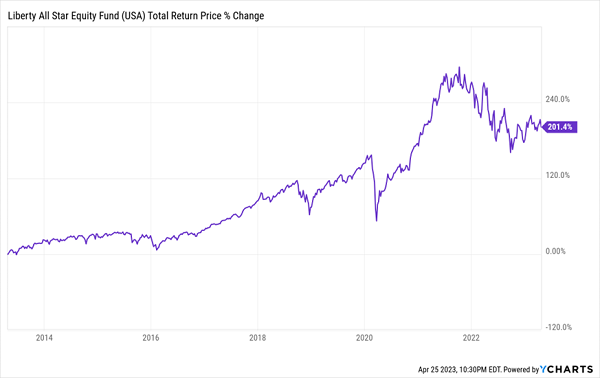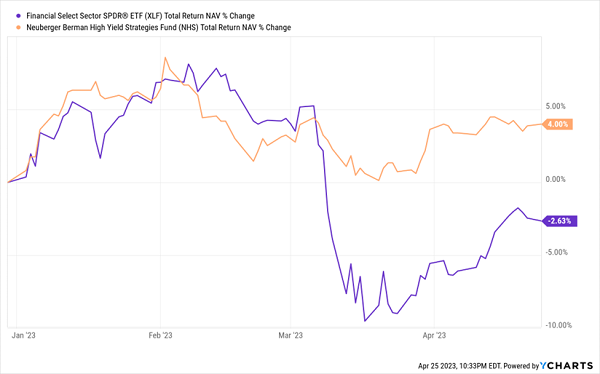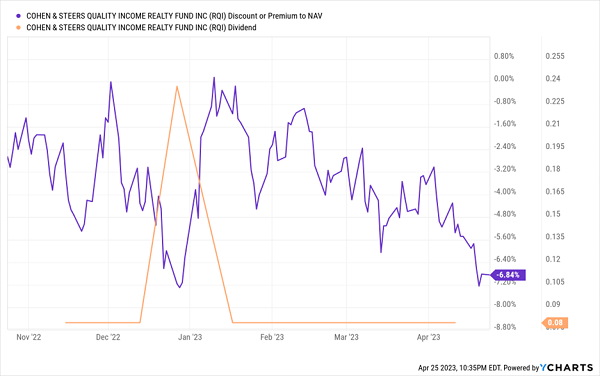These 3 Funds (Yielding 10.2%) Could Pay For Your Whole Retirement
With the recent pullback from the market’s high this year, we’ve got a nice second chance to buy some terrific dividend stocks cheap. But don’t waste your time with lame payers like General Mills (GIS), with its 2.5% yield. Or the miserly 2.1% you get from a so-called “Dividend Aristocrat” like McDonald’s (MCD).
Even though inflation is trending downward, it’s still at 5%. That’s well ahead of these pathetic blue-chip yields—and with the economy still performing well, it could be a while yet before it slows meaningfully from here.
Bottom line: We just can’t afford to own low payers like these any longer.
We need much more income if we want to achieve the dream scenario: a retirement funded entirely by dividends. That’s the path we’re going down today, with three closed-end funds (CEFs) boasting an outsized average yield of 10.2%.
That gets you an “instant” $85 per month in dividends on every $10K invested. In other words, you’d need just $697,000 to match the $71,000 median household income in America. That’s right, this portfolio replaces not one but two jobs on far less than a million dollars.
A 10.2% yield is also 6 times more than an index fund pays. Income like that is crucial in selloffs like the 2022 disaster because you won’t have to sell into a downturn, unlike folks who hold the typical S&P 500 index funds like the SPDR S&P 500 ETF Trust (SPY) and the Vanguard S&P 500 ETF (VOO).
Instead, these three funds’ dividends have kept investors away from the sell button for years, thanks to their payouts. This, over the long haul, is the real key to passive income’s power.
3 CEF Buys for Instant Diversification and 10%+ Dividends
Of course, diversification is critical, so we want our CEF portfolio to hold the following:
- Stocks (for long-term growth)
- Bonds (for stable income)
- Real estate (for a bit of both)
It’s not easy to cobble together a portfolio that ticks all three of these boxes. And if you invest in real estate through physical property, you’re looking at a lot of work. (If you’ve been a landlord, you know it’s a full-time job.)
But you can hit all three categories and get a big income stream with CEFs (with virtually no work!). Here are three funds that, taken together, do just that.
CEF Pick No. 1: A 10.2%-Yielder With a “Hidden” Discount
Let’s start with the Liberty All-Star Equity Fund (USA), which holds large-cap US companies with strong cash flows and growth potential, like Microsoft (MSFT), UnitedHealth Group (UNH) and Visa (V). USA’s managers have also done a nice job of scooping up oversold high-margin firms like Alphabet (GOOGL), Danaher Corp. (DHR) and Adobe (ADBE).
The draw here is, of course, the dividend, with USA yielding 10.2%. That dividend comes from payouts on slightly levered stocks in the portfolio, plus returns from management’s timely buys and sells. It’s a strategy that works, with USA posting an outstanding 201% total return in the last decade.
A “Star-Spangled” Dividend Buy for the Long Haul?
We also get a nice “in” courtesy of USA’s valuation. Right now, the fund trades around par (or about the same as the value of the shares in its portfolio). That’s a fair level when you consider that this one has traded at premiums north of 9% in the past year.
CEF Pick No. 2: A 12%-Payer That’s Survived Crash After Crash
For bonds, we’ll take the Neuberger Berman High Yield Strategies Fund (NHS), which gets you $1 in monthly income for every $100 you throw in it. If you think a payout like that can’t be safe, consider that NHS has kept it rolling in steadily for 10 years, despite the pandemic and rising rates.
The reason? A strategic pivot by management toward higher-quality, underpriced corporate bonds, all while avoiding all the banking-sector drama that has pulled down other assets.
NHS Locks in Slow and Steady Bond Profits
Those bonds, in particular, give NHS two ways to deliver strong returns: higher income and, over the longer term, gains as they get repriced with improving investor sentiment. This strategy is exactly what we want in this market, which is still oversold following the 2022 pullback.
NHS does trade at a 6% premium to net asset value (NAV) now, so we can’t expect a lot of upside from the closing discount here. The good news is that the fund will likely return to discount territory soon, as it’s spent most of 2023 trading below par.
The smart play, then, is to pick up USA and pick No. 3 (up next) now, then wait a bit to grab a piece of NHS’s high, safe payout when its valuation flips back into discount territory.
CEF Pick No. 3: An 8.5%-Yielding Portfolio Any Real Estate Investor Would Envy
Finally, let’s grab our real estate exposure through the Cohen & Steers Quality Income Realty Fund (RQI). The fund has more than 200 holdings, almost all which are real estate investment trusts (REITs). Those REITs, in turn, own hundreds, or even thousands, of properties apiece, so we have zero worries about diversification here.
Top RQI holdings include cell-tower owner American Tower (AMT), whose services are in constant demand as mobile-data traffic grows; self-storage REIT Public Storage (PSA), which stands to gain from the boom in “stuff” over the past couple years; and warehouse REIT Prologis (PLD), which is benefiting as US companies move their manufacturing back home.
REITs’ above-average dividends fuel RQI’s 8.5% payout, which has held steady for the last five years. With rising rents everywhere, the fund’s income stream is more secure than ever—but investors aren’t yet taking notice.
RQI’s High Payout Fights the Wall of Worry
Investors initially flocked to RQI in late 2022, after the fund successfully beat the misery that affected real estate that year and paid out a big special dividend. But that did not last, and the fund’s NAV gains (or the rise in the per-share value of its underlying portfolio) haven’t been met with price gains, resulting in a rare 6.8% discount to NAV that makes RQI a clear buy.
Plus, significantly more upside is on tap as a potential leveling off of interest rates, which the Fed has now made clear is happening starting in June, benefits real estate.
Put all three of the above CEFs together and you’ve got a 10.2% income stream fully diversified across hundreds of assets in three different classes. That’s a nice setup for the rest of 2023, but this portfolio will also keep giving out income for years and years to come.
These 5 Monthly Paying CEFs (Yielding 9%) Are “Must Buys” for ALL Income Investors
One of the best things about CEFs is that most of these funds pay dividends every single month. That, of course, is unheard of with “regular” stocks, which make you wait three long months for your next payout!
You’ll leave that all behind when you buy my top 5 monthly paying CEFs, which send a steady drip, drip, drip of monthly payments into your account. You always know exactly how much income you have to work with every month—because it never changes!
Plus these bargain-priced monthly payers yield a stout 9% now—a yield you can “lock in” by buying today.
This post originally appeared at Contrarian Outlook.
Category: Dividend Stocks







